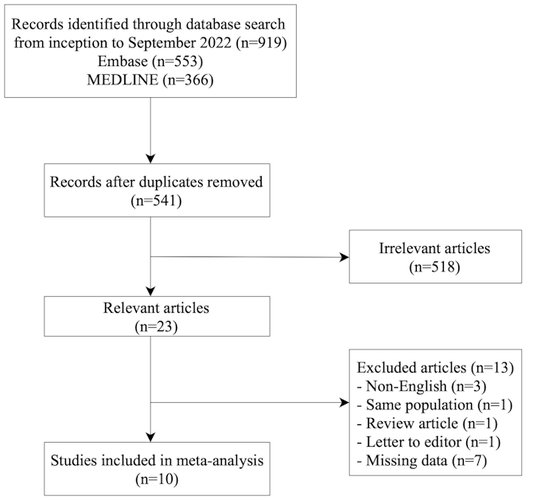-
Home
-
About JCTR
-
Gold Open Access
-
Issues
-
Editorial board
-
Author guidelines
-
Publication fees
-
Online first
-
Special issues
-
News
-
Publication ethics
-
Partners
-
Submit your manuscript
-
Submit your review report
-
Editorial Office
-

This work is licensed under a Creative Commons Attribution-NonCommercial 4.0 International License. ISSN print: 2382-6533 ISSN online: 2424-810X
Volume 9 Issue 5
Association of appendectomy with colorectal cancer: a systematic review and meta-analysis
Busara Songtanin*, Narisara Tribuddharat, Chanaka Kahathuduwa, Kenneth Nugent
Songtanin et al. J Clin Transl Res 2023; 9(5):23-00090
Published online: September 15, 2023
Abstract
Background: Appendectomy is a common surgical procedure done worldwide. The appendix is
known as a sanctuary for commensal organisms in the gut, and an inflamed appendix may alter the
gut microbiome, leading to inflammation and oncogenesis. An association between appendectomy
and subsequent colorectal cancer development has been postulated; however, previous studies have
differed in study design and results.
Method: We performed a systematic review and meta-analysis of studies evaluating the association
between appendectomy and colorectal cancer in adults. A literature search of MEDLINE and EMBASE
was conducted through September 2022. Search terms included “appendectomy” and “colon cancer”
or “rectal cancer” or “colorectal cancer.” Odds ratios and sensitivity analyses were calculated.
Result: Of the 541 studies identified in our search, 10 studies met our inclusion criteria. The
eight papers that studied the association between appendectomy and colorectal cancer reported no
association with the odds ratio (OR) of 1.30 (0.92, 1.83). However, studies on the association of
appendectomy and proximal versus distal colon cancer reported a statistically significant increase in
proximal colon cancer compared to distal colon cancer OR of 1.48 (1.29, 1.69).
Conclusion: Our study demonstrates that appendectomy is associated with the development of
proximal colon cancer but not distal colon cancer.
Relevance for patients: Patients who have had an appendectomy should be aware of the potentially
increased risk for colon cancer. Consequently, they should provide this information during routine
clinic visits, especially if they are having gastrointestinal symptoms.

DOI: http://dx.doi.org/10.18053/jctres.09.202305.23-00090
Author affiliation
1. Department of Internal Medicine, Texas Tech University Health Sciences Center, Lubbock, TX, United States of America
2. Department of Medicine, School of Medicine, Siriraj Hospital, Mahidol University, Bangkok, Thailand
*Corresponding author
Busara Songtanin
Department of Internal Medicine, Texas Tech
University Health Sciences Center, Lubbock,
TX, United States of America.
Email: busara.songtanin@ttuhsc.edu
Handling editor:
Michal Heger
Department of Pharmaceutics, Utrecht University, the Netherlands
Department of Chemistry, Utrecht University, Utrecht, the Netherlands
Department of Pathology, Erasmus Medical Center, the Netherlands
Department of Pharmaceutics, Jiaxing University Medical College, Zhejiang, China

